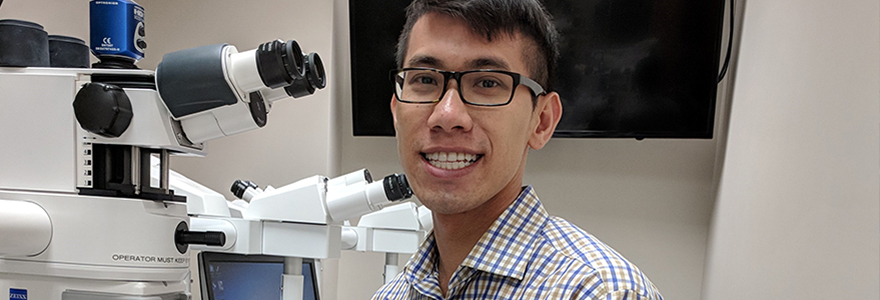Resident Spotlight: Dr. Chris Tran, PGY3

Dr. Chris Tran is a third-year resident in Pathology and Laboratory Medicine. It was during his pre-clerkship that he became fascinated by the way clinical diseases are the result of complex genetic, cellular and histological changes. He then shadowed a pathologist and learned to appreciate the importance of pathological diagnoses and the influence they have on patient care. He knew then that Pathology was his calling.
"It can be easy to experience imposter syndrome going into a new environment and working with new co-residents. One of the benefits of our pathology residency program is that all of the residents work at one site, in one room."
Tell us about your background and your academic path.
I grew up in the west end of
Why did you choose to pursue medicine?
I chose to pursue medicine because I wanted a career where I could continually grow and take on new challenges. In addition to clinical work, physicians can take on diverse roles (researchers, administrators, public advocates, just to name a few) and it was the ability to contribute through different avenues that
What drew you to Schulich Medicine & Dentistry?
After completing electives in anatomical pathology across the country, I found the program at the Schulich School of Medicine & Dentistry to be a great fit. The residency program was strong, with extensive case exposures, regular practice exams and a significant number of teaching rounds. More than that, however, I was attracted to the great collegiality between the residents and staff, and among residents. For me, a supportive and collaborative learning environment was important.
Describe your experience so far as a resident at Schulich Medicine?
In Pathology, our first year of residency comprises off-service rotations in a variety of medical and surgical specialties, with a focus on oncology. These rotations help to consolidate our clinical knowledge and prepare for the LMCC part II.
From second year onward, we rotate through different pathology subspecialties (e.g. gynecology, skin, autopsy.) The majority of our day-to-day clinical work involves working through cases and reviewing them with a staff pathologist. We attend pathology-specific teaching rounds, as well as multidisciplinary rounds such as tumour boards. In addition, we spend time grossing specimens (examining tissues and dissecting them for microscopic examination), covering frozen sections (rapidly analyzing specimens to answer specific questions during an operation), and performing autopsies. The biggest misconception is that we only sit at the microscope, but in reality, we work in different environments and have a wide range of responsibilities.
What challenges have you encountered in your residency?
A vast amount of knowledge is required in pathology and at the beginning, identifying things you do not know is the norm rather than the exception. As a result, going through residency can sometimes feel like a daunting task. However, realizing that Rome was not built in a
What have you learned about yourself and others through your residency?
It can be easy to experience imposter syndrome going into a new environment and working with new co-residents. One of the benefits of our pathology residency program is that all of the residents work at one site, in one room. I see the diverse skills and interests within the group – from research to social media to business. With my background in genetic epidemiology and biostatistics, I was able to identify skills within myself that were not as common as I had assumed. I learned to appreciate that everyone (myself included) can contribute their unique niche in a team setting.
What was the last book you read?
I recently read Thinking Fast Thinking Slow, which describes how we use two systems of thought, one that is fast and instinctive, and one that is more slow and deliberate. This book illustrates how we can develop biases in our thinking.
What activities/initiatives are you involved with that help bring balance in your life?
I enjoy going to the gym, watching obscure documentaries, and spending time outdoors with my mini dachshund.








